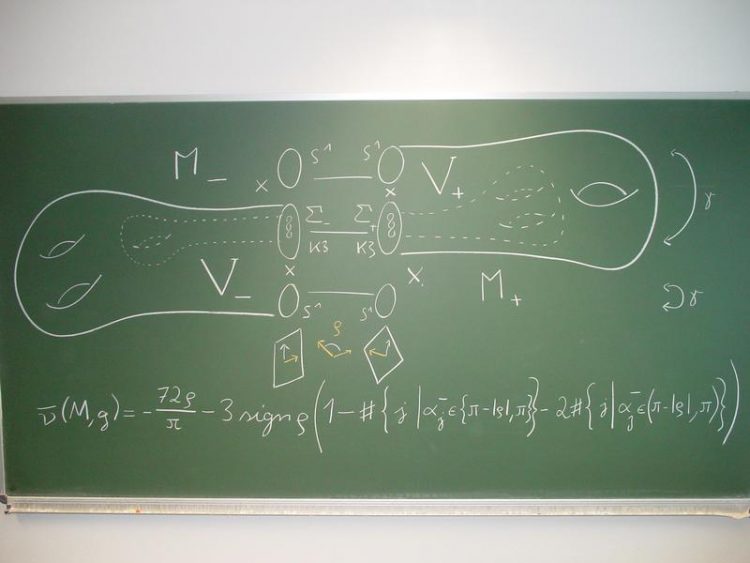Studying Curved Spaces

The sketch describes an "extra twisted connected sum," a special G2 manifold. Below it is a formula for its extended nu-invariant. Photo: Sebastian Goette
The Freiburg mathematician Prof. Dr. Sebastian Goette will receive a total of 650,000 US dollars in funding over the coming four years for his involvement in the project “Special Holonomy in Geometry, Analysis, and Physics.” The funding is being provided by the Simons Foundation, a non-profit organization in the USA that supports fundamental research in mathematics and natural sciences.
Director of the project is the mathematics professor Robert Bryant from Duke University, USA. Other collaborators include researchers from Stony Brook University and University of California in the USA and Imperial College London, King's College London, University of Bath, and University of Oxford in England.
The project focuses on Riemannian manifolds with special holonomy. These are spaces whose curves have special properties, in particular the so-called Calabi–Yau, G2, and spin(7) manifolds. These spaces fulfill the Einstein equations in vacuum, meaning that a universe without matter could take on their shape. In physics, they are needed to establish a connection between various string theories in ten dimensions or the M-theory in eleven dimensions and the space–time continuum.
Described in Albert Einstein’s general theory of relativity, the space–time continuum is the unification of space and time in a single four-dimensional structure. The string theories and the M-theory, which was developed on the basis of the former, are regarded as a promising approach for resolving the theoretical incongruities between quantum physics and the general theory of relativity.
“From a mathematical standpoint, Riemannian manifolds with special holonomy are spaces with an especially beautiful geometry,” says Goette. The goal of the collaboration is to construct more examples of such spaces and to gain further insight on the relationship between their geometrical and physical properties as well as these properties themselves. “The Freiburg subproject focuses on G2 manifolds, which are necessary for M-theory,” says Goette. “We are studying global geometrical properties and using them to compare various constructions of G2 manifolds.”
James Simons, an American mathematician, hedge-fund manager, and CO-founder of the Simons Foundation, with his wife, Marilyn Simons, also dealt with special holonomy in his 1962 doctoral dissertation.
Further information:
http://www.simonsfoundation.org/mathematics-and-physical-science/news-announceme…
Contact:
Prof. Dr. Sebastian Goette
Institute of Mathematics
University of Freiburg
Phone: +49 (0)761/203-5571
E-Mail: sebastian.goette@math.uni-freiburg.de
Media Contact
All latest news from the category: Physics and Astronomy
This area deals with the fundamental laws and building blocks of nature and how they interact, the properties and the behavior of matter, and research into space and time and their structures.
innovations-report provides in-depth reports and articles on subjects such as astrophysics, laser technologies, nuclear, quantum, particle and solid-state physics, nanotechnologies, planetary research and findings (Mars, Venus) and developments related to the Hubble Telescope.
Newest articles

Recovering phosphorus from sewage sludge ash
Chemical and heat treatment of sewage sludge can recover phosphorus in a process that could help address the problem of diminishing supplies of phosphorus ores. Valuable supplies of phosphorus could…

Efficient, sustainable and cost-effective hybrid energy storage system for modern power grids
EU project HyFlow: Over three years of research, the consortium of the EU project HyFlow has successfully developed a highly efficient, sustainable, and cost-effective hybrid energy storage system (HESS) that…

After 25 years, researchers uncover genetic cause of rare neurological disease
Some families call it a trial of faith. Others just call it a curse. The progressive neurological disease known as spinocerebellar ataxia 4 (SCA4) is a rare condition, but its…





















